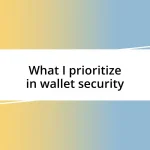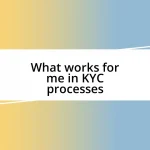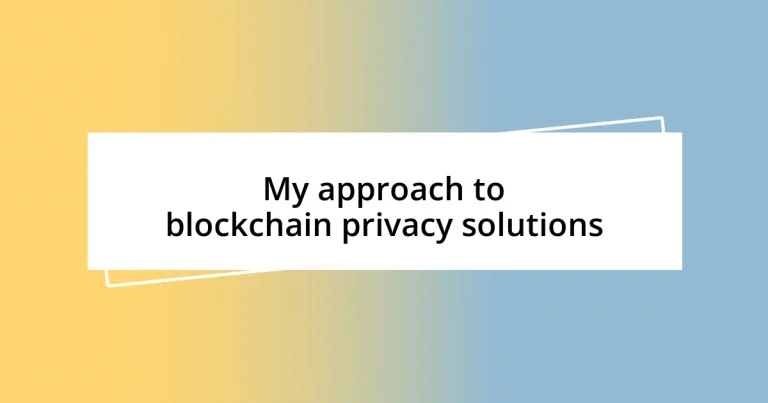Key takeaways:
- Blockchain privacy solutions, including zero-knowledge proofs and mixers, enhance information security and are essential for user confidence and engagement in the technology.
- The balance between transparency and privacy is crucial; strong privacy measures help prevent users from shying away from blockchain due to concerns over exposure and unwanted scrutiny.
- Implementing privacy tools, like decentralized identity protocols and zk-SNARKs, empowers users by giving them control over their data, ultimately fostering trust and security in blockchain applications.
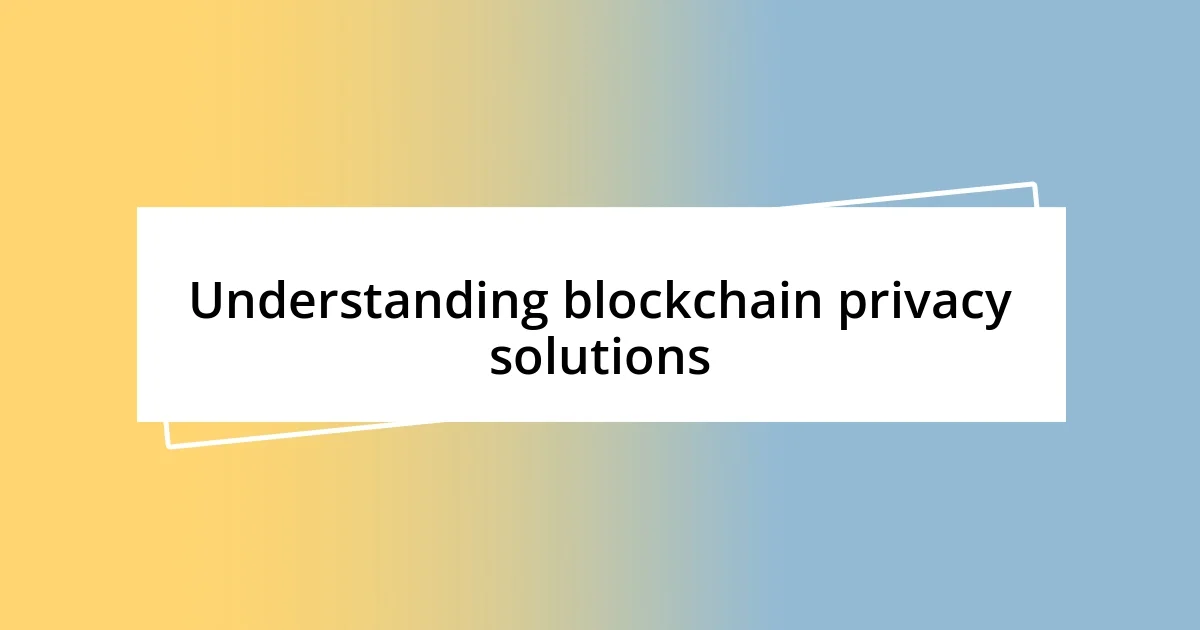
Understanding blockchain privacy solutions
When diving into blockchain privacy solutions, it’s fascinating to realize how the technology fundamentally transforms the way we think about information security. I remember my first introduction to this concept; it felt like stumbling upon a hidden treasure trove of potential. Why should we blindly trust a system that exposes every transaction and detail? Privacy in blockchain isn’t just a feature; it’s a necessity for creating a safe and ethical digital economy.
Privacy solutions in blockchain often revolve around techniques like zero-knowledge proofs and mixers. Zero-knowledge proofs, for instance, allow one party to prove to another that they know a value, without revealing the value itself. This was a game-changer for me—understanding that you could validate information without compromising privacy opened my eyes to opportunities in secure communications. What if every piece of your data could be verified without ever being exposed? That’s the power of these innovations.
Furthermore, the need for robust privacy solutions is amplified as more users enter the blockchain space. I’ve spoken to many newcomers who express concern about transaction transparency; they worry about their purchases being traceable. Realizing that not all blockchain is created equal can be daunting, but that’s where privacy solutions come into play—addressing these anxieties and empowering users to engage in a more secure manner. It’s an ongoing journey, and I’m excited to see how these solutions evolve.
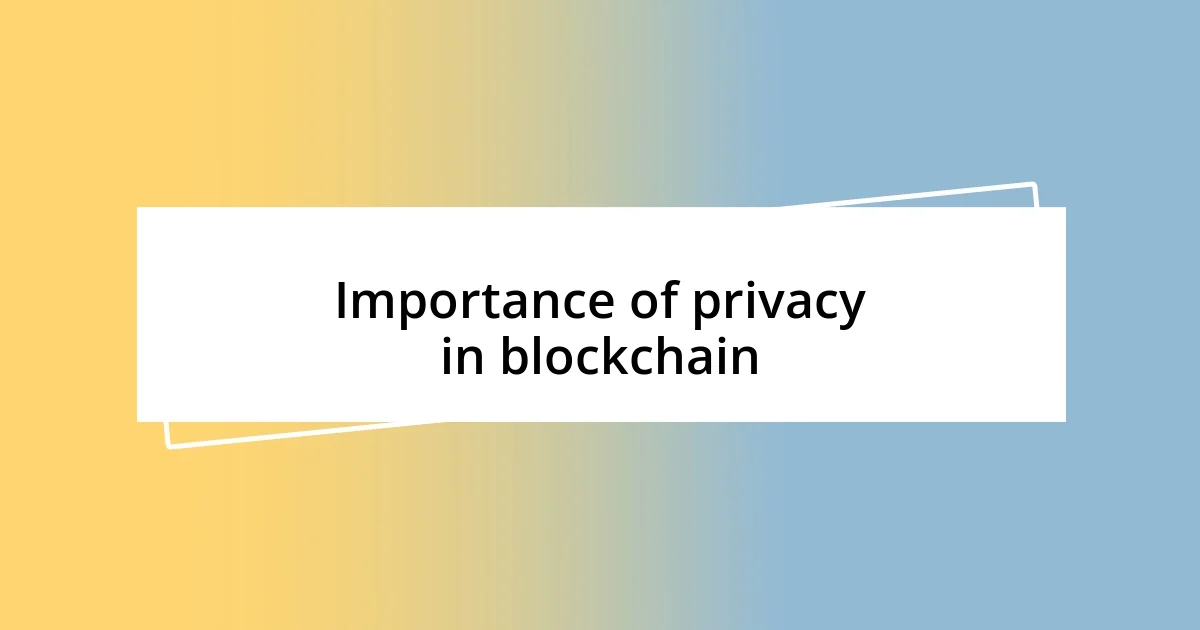
Importance of privacy in blockchain
The significance of privacy in blockchain cannot be overstated. When I first discovered how transparent transactions could be, I felt both excitement and apprehension. It dawned on me that while transparency fosters trust, it’s also a double-edged sword. Just imagine conducting every financial transaction with your life laid bare for the world to see. Without strong privacy measures, users may shy away from adopting blockchain technologies, fearing repercussions or unwanted scrutiny.
In the world of cryptocurrencies, privacy serves as a shield for individual identities. I remember a colleague who hesitated to invest in crypto because she feared her financial habits would become public. The anxiety surrounding exposure can deter even the most enthusiastic users. Implementing privacy features can help alleviate such concerns, ensuring that blockchain remains a space where individuals feel safe to engage without worry.
Moreover, the nature of privacy evolves with the growth of the digital ecosystem. As blockchain technology integrates further into various industries, the stakes become higher. I’ve personally witnessed organizations struggling to balance transparency with confidentiality. Effective privacy solutions don’t just protect transaction data; they foster a sense of comfort and security, encouraging a wider adoption of blockchain technology.
| Aspect | Impact of Privacy |
|---|---|
| Trust | Increases user confidence in transactions |
| Security | Protects sensitive information from exposure |
| User Adoption | Encourages hesitant users to engage with blockchain |
| Innovation | Drives the development of new private frameworks and protocols |
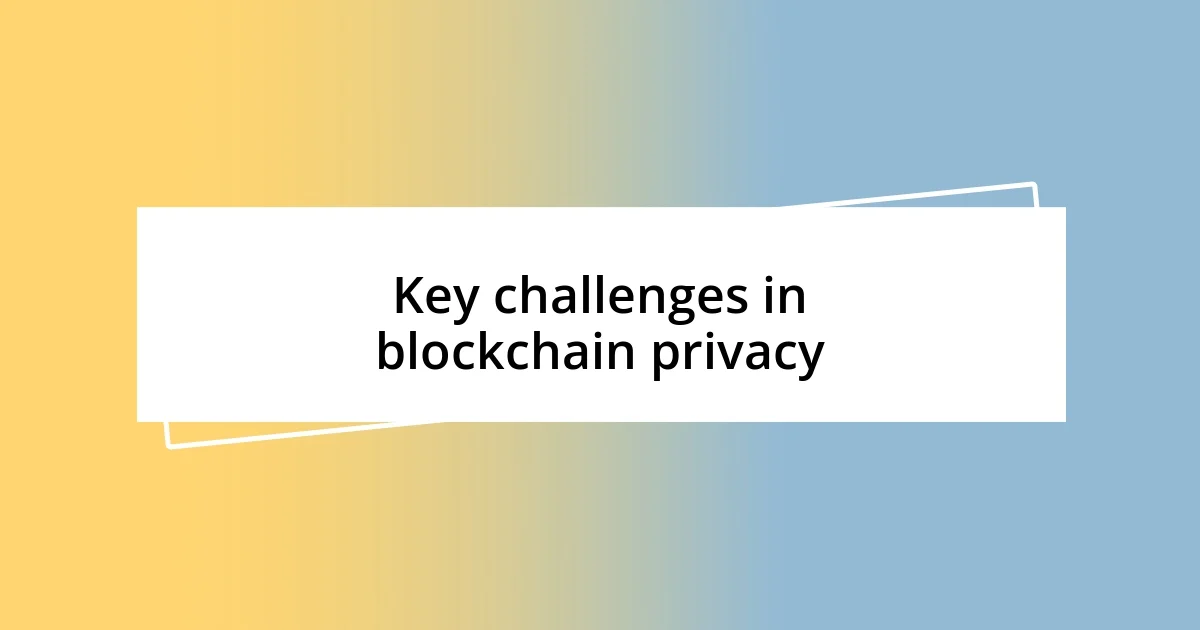
Key challenges in blockchain privacy
Privacy in blockchain is riddled with challenges that require careful navigation. One of the most significant hurdles is the balance between transparency and privacy. I recall an incident when a small business owner I know hesitated to adopt blockchain for payment processing due to fears that her client transactions would be publicly visible. This highlights a larger issue: while the very nature of blockchain promotes transparency, it can also expose sensitive data, deterring individuals and organizations from fully embracing the technology.
Here are some key challenges that undermine blockchain privacy:
- Transaction traceability: Most blockchain systems allow anyone to track transactions, which can lead to unwanted exposure of personal financial habits.
- Public key associations: Public addresses tied to identities can create a clear link to transactions, risking privacy for users.
- Regulatory pressures: Increasing government regulations can push projects to prioritize compliance over user privacy.
- Technical complexity: Implementing advanced privacy features often requires a high level of technical expertise, which many users lack.
- Network obfuscation: The effectiveness of privacy solutions can be diluted if malicious actors exploit weaknesses in network protocols.
Navigating these challenges is essential for fostering a secure environment. I often reflect on discussions with fellow crypto enthusiasts who worry about their anonymity online. These conversations remind me that pushing for better privacy in blockchain isn’t just a technical issue; it’s about securing our freedom to operate in the digital world without fear of judgment or exposure.
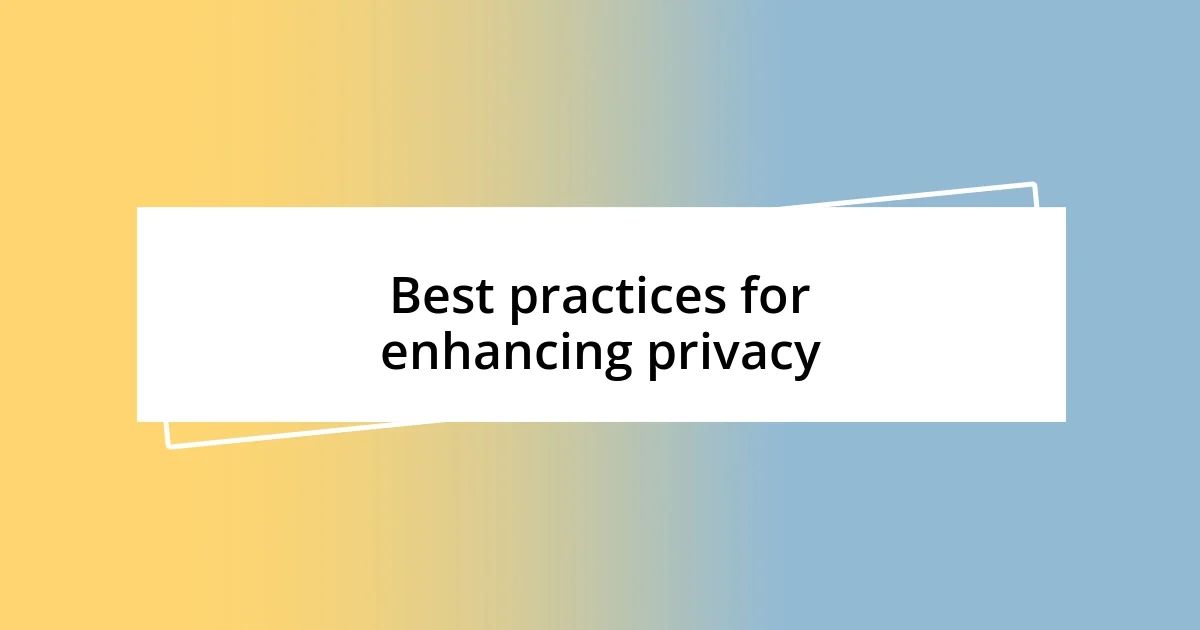
Best practices for enhancing privacy
Enhancing privacy in blockchain requires a thoughtful approach, and one of the best practices I’ve encountered is leveraging advanced encryption techniques. When I first delved into employing zero-knowledge proofs (ZKPs), I was amazed by their potential to validate transactions without revealing any actual data. This method not only keeps user information secure but also maintains the integrity of the blockchain. It’s like having a locked vault—everything is protected inside, yet key stakeholders can still verify the contents without ever cracking it open.
Another practical tactic is using privacy coins, which are specifically designed to obscure transaction details. I remember the first time I purchased this way, feeling an immense sense of relief knowing my financial activity was shielded from prying eyes. Coins like Monero and Zcash use innovative technologies to ensure transactions can’t be traced back to individual users, allowing participants to engage without anxiety. Isn’t it comforting to think that we can reclaim control over our financial narratives in an increasingly connected world?
Lastly, regularly auditing and updating privacy protocols is crucial. I’ve seen firsthand how staleness can compromise security; it’s like leaving your front door unlocked because it was secure yesterday. Keeping abreast of the latest privacy enhancements and incorporating them into your blockchain strategy can make a significant difference. The world of blockchain is always evolving, and by being proactive with these best practices, I firmly believe we can foster a culture of trust and security that empowers everyone involved.
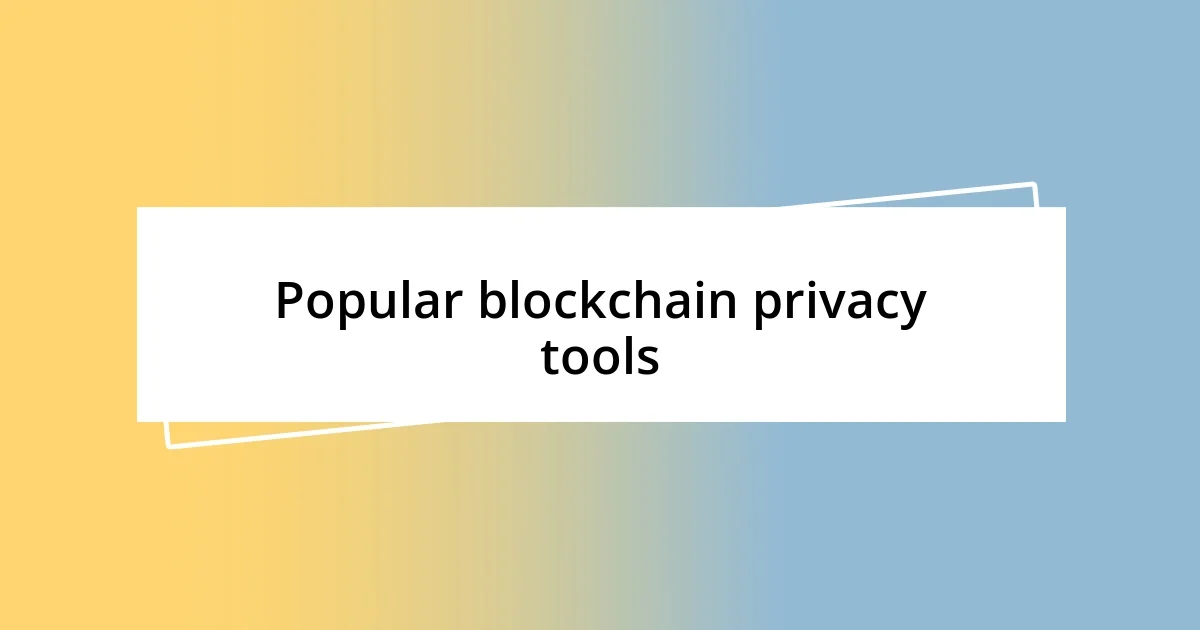
Popular blockchain privacy tools
When considering popular blockchain privacy tools, one cannot overlook the effectiveness of mixers or tumblers. These tools allow users to obscure their transaction history by blending multiple transactions together. I remember using a mixer for my own transactions and feeling a wave of relief as I realized how much more secure my financial data felt, like moving through a crowd rather than standing alone. This method is particularly appealing for those who want to maintain a low profile in their digital dealings.
Another noteworthy tool is the use of decentralized identity protocols, which give users control over their personal data. Just a few months ago, I participated in a community workshop showcasing how these protocols minimize unnecessary data sharing. It was enlightening to see how decentralized identities empower individuals by putting them in charge, much like deciding who gets to peek into my diary. I often wonder how many people realize that these solutions could fundamentally reshape our relationships with data—who holds it and how it’s used.
Moreover, privacy-enhancing technologies, such as zk-SNARKs (zero-knowledge succinct non-interactive arguments of knowledge), cannot be ignored. I first encountered this term while exploring privacy coins, and it was mind-blowing to learn how it allows verification of transactions without revealing any underlying data. It’s like proving you’re a member of an elite club without ever disclosing your identity. With solutions like these, the potential for user privacy in blockchain seems limitless, and as I reflect on that, I can’t help but feel a sense of optimism for what lies ahead.
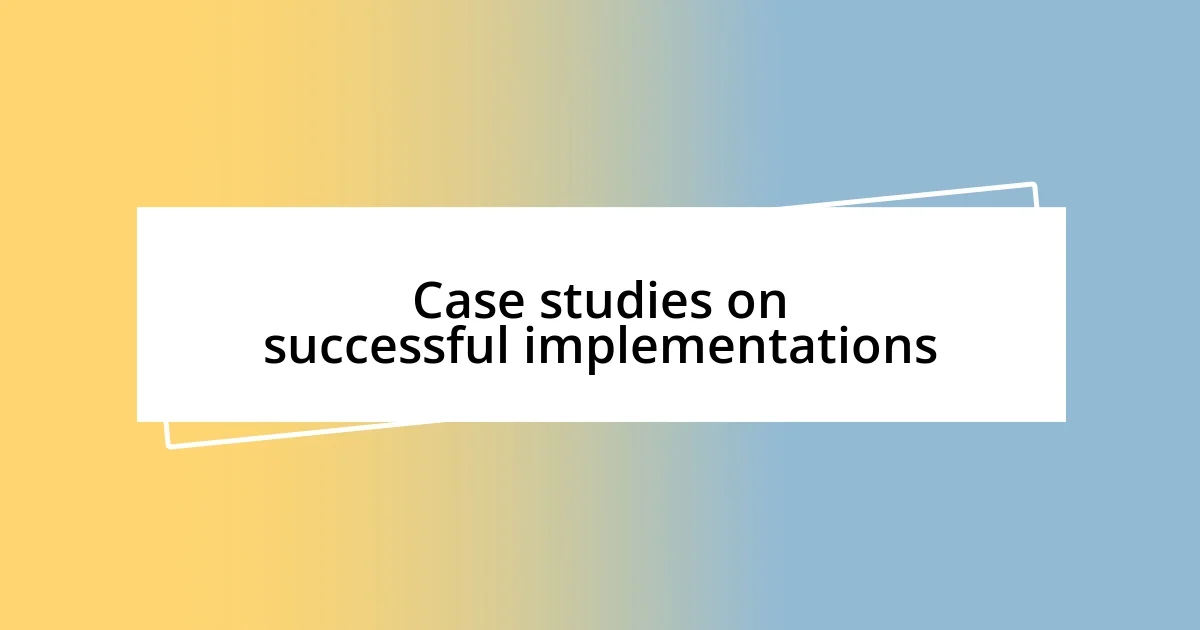
Case studies on successful implementations
One of the most striking case studies I recall is that of a major supply chain company that implemented ZKPs to enhance transaction privacy. They managed to validate the authenticity of shipments without revealing sensitive information about their suppliers or pricing. The moment I learned about the significant reduction in fraud, I was reminded of how privacy can build trust—not just between the company and its partners but among all stakeholders involved.
Another intriguing example comes from a decentralized finance (DeFi) platform that integrated mixers into their ecosystem. By allowing users to obscure their transaction history, they not only improved user retention but also attracted new participants wary of public ledgers. It’s fascinating to see how something as simple as adding a layer of anonymity can transform a platform’s user dynamics and make participation feel safer for everyone.
I also think back to a local community project that utilized decentralized identity protocols to help citizens manage their personal data in voting. This approach empowered individuals to provide only necessary information while keeping other details private. When discussing this initiative with community members, the relief in their voices was palpable—many felt they could finally engage without fear of their data being misused. Isn’t it incredible how such solutions can redefine our sense of security in public processes?



